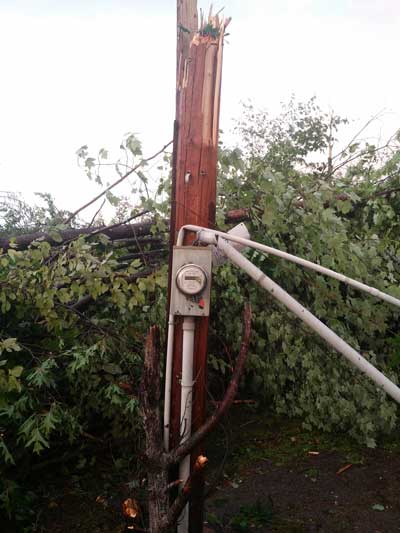Tornado or My Excuse for Not Writing

Astute readers may have noticed that I haven't written anything for a while. In fact, I haven't written much since about 4:40 pm on Friday September 21 last year. There is a simple reason for this: our house got hit by a Tornado. It could have been a lot, lot worse. We lived on the edge of a forest, surrounded by trees. Five or six trees fell on the house, but the forest protected the house from the worst of the wind.
There is no forest now.
My wife, my son, my dog and I were inside the house at the time. I wish I could provide a graphic description of the tornado, but I can't. Apparently I did all the right things, but I have no actual memory of events. I only remember a view through the patio windows of a a sea of green leaves and debris - as if the house was swimming among thick turbulent seaweed - then us all being in the basement bathroom with a torch and wanting to go upstairs to check what had happened. (Apparently this is dissociative amnesia: not uncommon after traumatic events).
Our road was blocked by fallen trees for a day. Power was out for a week due to fallen hydro poles. Phone lines were out for a similar period.
So far it's just a tragic story. Nobody died. A chance event in an area which hadn't seen a hint of a tornado in twenty-five years. Just bad luck.
But there are still lessons to be learned. Things did not go smoothly. There were errors made by the city, the insurer, and the disaster recovery company brought in to repair the damage. We're still not back in our house, and having our house repaired has proved to be an all-consuming distraction. I will write about these at a later date.
Although I'm to write about this from a personal perspective, the lessons apply just as well to most businesses.
Here are some things which went ok, if not well:
- Always have an off-site backup. I did have all major business and personal files backed up to the cloud. I hadn't tested the backups recently, but they were working. I also hadn't tried restoring the data to a different computer, which caused a minor panic and required a technical support call to accomplish. Equally importantly, I had the account details, encryption passwords, etc stored safely off-site. Without these the backups would have been useless.
- Keep important documents in a media safe in a suitable location. A media safe keeps material at lower temperatures for longer times in the event of a fire. A suitable location is one which won't be flooded, or result in the safe falling through a floor in a fire. Or keep the documents off site in a protected location if that makes sense.
- Keep emergency supplies on hand for 72 hours. We were without outside contact for several hours, the road wasn't re-opened for a day, and we didn't have any transport for a longer period. If you read your city's emergency plan (I'm probably one of the few people who has read ours) you will discover that when there is a major disaster everybody is expected to fend for 72 hours. Emergency services may be very limited or non-existent for this period. Although we had rum down our emergency supplies, we did have sufficient water on hand for drinking and sanitation. Since we get frequent enough power cuts (which shut off well water for a few hours) we're always pretty well prepared here.
- Have a battery operated portable radio with spare batteries. We didn't have power, phone lines, or reliable mobile phones after the tornado struck. Our battery radio was the only source of information. You may have a radio in your car, but it won't be very convenient if you want to move around.
- Make sure everybody knows what to to do and where they will go if a severe weather event occurs. There was no warning and no time for discussion. Fortunately we had previously identified the basement bathroom (no windows, center of house) as the best refuge, and that's where we went.
And here are the things we wished we had done better:
- Keep an electronic copy of key documents in a secure off-site backup. Often a scanned copy of a document will be enough for a particular requirement. We ran into problems a couple of months later because a scan of my daughter's degree certificate was required for a visa application and couldn't be found. If we had made an electronic copy, it would not have been an issue.
- Keep an up-to-date electronic photo inventory off-site. We had a video inventory, but the quality of the video still images wasn't good, and is nowhere near as good as the quality of photo images. We know what things we are looking at in video stills, but for other people it is a challenge. When you need to prove a loss, nothing beats a good photo. For expensive items, keep track of the model numbers and serial numbers too.
Tornadoes are just one of several low probability high impact events with sudden onset without prior warning. These can be a real challenge for planners: the low probability makes it harder for them to be taken seriously, but the sudden onset and high impact means that planning can't be deferred and staff awareness and training is essential.
A shameless plug seems appropriate here for our product Plan424 which is designed to solve this training / awareness problem. It helps companies make sure everybody knows what to do in an emergency. I just wish I didn't have to get hit by a tornado to realize just how important this is.